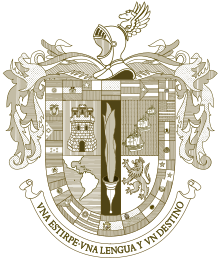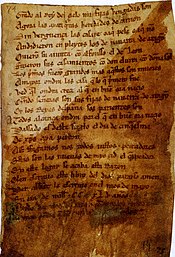Association of Academies of the Spanish Language
 | |
 Countries where Spanish-language academies exist. | |
| Abbreviation | ASALE |
|---|---|
| Formation | 1951 |
| Headquarters | Madrid, Spain |
Official language | Spanish |
President | Santiago Muñoz Machado[1] |
General Secretary | Francisco Javier Pérez |
Main organ | Permanent commission |
| Website | www |
The Association of Academies of the Spanish Language (Spanish: Asociación de Academias de la Lengua Española; ASALE) is an entity whose end is to work for the unity, integrity, and growth of the Spanish language.[2] It was created in Mexico in 1951 and represents the union of all the separate academies in the Spanish-speaking world. The association publishes reference works on the Spanish language and commemorative editions of Hispanic literature, among other publications.[3][4][5][6]
History
[edit]Through the initiative of then-president of Mexico Miguel Alemán Valdés, the first congress of academies convened with the purpose of maintaining the integrity of and fostering the further growth of Spanish.[4] The meeting was held from 23 April to 6 May 1951 and resulted in the creation of the association[7] and its permanent commission.[8] The Royal Spanish Academy (Spanish: Real Academia Española or RAE) was not present at the initial meeting but participated in the permanent commission.[8] Ever since the second congress convened in 1956, the RAE has been a regular participant.[citation needed]
In 2000 the association organised the School of Hispanic Lexicography and the Carolina Foundation to promote Spanish lexicography[citation needed], and together with the RAE, the association earned the Prince of Asturias Award for peace.[7]
An academy for Equatorial Guinea was created in 2013 and joined the association in 2016.[9]
Congresses
[edit]| Number | Date | City | Territory | Notes |
|---|---|---|---|---|
| I | 23 April – 6 May 1951 | Mexico City | Mexico | The RAE was not present |
| II | 22 April – 2 May 1956 | Madrid | Spain | |
| III | 27 July – 6 August 1960 | Bogotá | Colombia | |
| IV | 30 November – 10 December 1964 | Buenos Aires | Argentina | The Cuban delegation did not participate |
| V | 24 July – 19 August 1968 | Quito | Ecuador | Delegations from Cuba and Venezuela were not present |
| VI | 20–29 November 1972 | Caracas | Venezuela | |
| VII | 13–23 November 1976 | Santiago de Chile | Chile | Delegations from Cuba and Mexico were not present |
| VIII | 20–27 April 1980 | Lima | Peru | The Cuban delegation did not participate |
| IX | 8–15 October 1989 | San Jose | Costa Rica | Delegations from Cuba, Honduras, and Paraguay were not present |
| X | 24–29 April 1994 | Madrid | Spain | |
| XI | 15–19 November 1998 | Puebla de Zaragoza | Mexico | |
| XII | 12–15 November 2002 | San Juan | Puerto Rico | |
| XIII | 21–24 March 2007 | Medellin | Colombia | |
| XIV | 21–25 November 2011 | Panama City | Panama | |
| XV | 23–25 November 2015 | Mexico City | Mexico | |
| XVI | 4–8 November 2019 | Sevilla | Spain | |
| XVII | 11–13 November 2024 | Quito | Ecuador |
Works
[edit]The collaboration between RAE and the other academies was expressed in the coauthorship, since the 22nd edition published in 2001, of the Dictionary of the Spanish Language (Spanish: Diccionario de la Lengua Española), and the 1999 edition of the Orthography (Spanish: Ortografía) was considered a true pan-Hispanic work. Joint projects include the editing of the Grammar (Spanish: Gramática) and the compilation of the Dictionary of Americanisms (Spanish: Diccionario de americanismos).[citation needed]
Organization
[edit]The association convenes every four years, led by a Permanent Commission composed of a President (position held by the Director of the Spanish Royal Academy), a Secretary General (one of the directors of the other academies), a Treasurer (chosen by the Spanish Royal Academy), and at least two board members drawn from the associated academies, whose nomination rotate annually.[3][10][11] During the Third Congress of Academies, held in Bogotá, Colombia, in 1960, an agreement was reached whereby the governments of countries with a member in the association would be obliged to provide financial support to their respective academies and the greater association.[12]
Academies
[edit]| Country | Name in Spanish | Name in English | Founded |
|---|---|---|---|
| Spain | Real Academia Española | Royal Spanish Academy | 1713 |
| Colombia | Academia Colombiana de la Lengua | Colombian Academy of the Language | 1871 |
| Ecuador | Academia Ecuatoriana de la Lengua | Ecuadorian Academy of the Language | 1874 |
| Mexico | Academia Mexicana de la Lengua | Mexican Academy of the Language | 1875 |
| El Salvador | Academia Salvadoreña de la Lengua | Salvadoran Academy of the Language | 1876 |
| Venezuela | Academia Venezolana de la Lengua | Venezuelan Academy of the Language | 1883 |
| Chile | Academia Chilena de la Lengua | Chilean Academy of the Language | 1885 |
| Peru | Academia Peruana de la Lengua | Peruvian Academy of the Language | 1887 |
| Guatemala | Academia Guatemalteca de la Lengua | Guatemalan Academy of the Language | 1887 |
| Costa Rica | Academia Costarricense de la Lengua | Costa Rican Academy of the Language | 1923 |
| Philippines | Academia Filipina de la Lengua Española | Philippine Academy of the Spanish Language | 1924 |
| Panama | Academia Panameña de la Lengua | Panamanian Academy of the Language | 1926 |
| Cuba | Academia Cubana de la Lengua | Cuban Academy of the Language | 1926 |
| Paraguay | Academia Paraguaya de la Lengua Española | Paraguayan Academy of the Spanish Language | 1927 |
| Bolivia | Academia Boliviana de la Lengua | Bolivian Academy of the Language | 1927 |
| Dominican Republic | Academia Dominicana de la Lengua | Dominican Academy of the Language | 1927 |
| Nicaragua | Academia Nicaragüense de la Lengua | Nicaraguan Academy of the Language | 1928 |
| Argentina | Academia Argentina de Letras | Argentine Academy of Letters | 1931 |
| Uruguay | Academia Nacional de Letras | National Academy of Letters | 1943 |
| Honduras | Academia Hondureña de la Lengua | Honduran Academy of the Language | 1949 |
| Puerto Rico | Academia Puertorriqueña de la Lengua Española | Puerto Rican Academy of the Spanish Language | 1955 |
| United States | Academia Norteamericana de la Lengua Española | North American Academy of the Spanish Language | 1973 |
| Equatorial Guinea | Academia Ecuatoguineana de la Lengua Española | Equatoguinean Academy of the Spanish Language | 2013 |
| Israel | Academia Nacional del Judeoespañol en Israel | National Academy of Judaeo-Spanish in Israel | 2020 |
Although Israelis mainly speak Hebrew, Arabic, English, and Russian, an ASALE conference on Judaeo-Spanish held in 2015[13] led to plans for the creation of an Israeli branch.[14] A group of academics was founded by ASALE in 2018 and submitted to the government of Israel for recognition. The National Academia of Judaeo-Spanish in Israel will then have the ability to petition to join as a full member, likely in 2019.[15][needs update] There are no plans for Belize, Gibraltar, or Andorra to have their own academies, despite each having a majority Spanish-speaking population either as a first or second language. There is also a substantial Spanish population in Brazil and Western Sahara.[citation needed]
See also
[edit]- Autoridad Nasionala del Ladino – a defunct Israeli body that regulated Ladino
- Cervantes Institute – a Spanish cultural institution
- Panhispanism – promotion of unity among Spanish speakers
- List of language regulators
- International Conference of the Spanish Language
References
[edit]- ^ Mantilla, Jesús Ruiz (4 April 2019). "Pedro Sánchez asegura ante los académicos el apoyo del Gobierno a la RAE". El País (in Spanish). Retrieved 7 June 2019.
- ^ "Estatutos y reglamento de la Asociación de Academias de la Lengua Española" [Statutes and regulation of the Association of Academies of the Spanish Language] (PDF). ASALE. 2007. Archived (PDF) from the original on 18 September 2017. Retrieved 14 June 2018.
- ^ a b "Estatutos y organización". Asociación de Academias de la Lengua Española. Archived from the original on 8 April 2014. Retrieved 1 November 2017.
- ^ a b "I Congreso (México, 1951)". Asociación de Academias de la Lengua Española. Archived from the original on 1 November 2017. Retrieved 1 November 2017.
- ^ "Obras y proyectos". Asociación de Academias de la Lengua Española. Archived from the original on 2017-11-03. Retrieved Nov 3, 2017.
- ^ "Publicaciones". Asociación de Academias de la Lengua Española. Archived from the original on 2017-11-03. Retrieved Nov 3, 2017.
- ^ a b "Siglo XX". Asociación de Academias de la Lengua Española. Archived from the original on 1 November 2017. Retrieved 1 November 2017.
- ^ a b "Historia". Asociación de Academias de la Lengua Española. Archived from the original on 1 November 2017. Retrieved 1 November 2017.
- ^ "Aprobada la incorporación de la Academia Ecuatoguineana a la ASALE". Asociación de Academias de la Lengua Española. 19 March 2017. Archived from the original on 27 March 2016. Retrieved 1 November 2017.
- ^ Villanueva, Darío (30 November 2015). "Bienvenida del presidente". Asociación de Academias de la Lengua Española. Archived from the original on 2 November 2017. Retrieved 2 November 2017.
- ^ Pérez, Francisco (28 January 2016). "Saludo del secretario general". Asociación de Academias de la Lengua Española. Archived from the original on 2 November 2017. Retrieved 2 November 2017.
- ^ "Convenio multilateral Asociación de Academias de la Lengua Española" (PDF). Asociación de Academias de la Lengua Española. 1960. Archived from the original (PDF) on 13 June 2017. Retrieved 2 November 2017.
- ^ "La RAE elige a ocho académicos correspondientes judeoespañoles". Real Academia Española. Nov 12, 2015. Archived from the original on 2016-11-20. Retrieved Nov 2, 2017.
- ^ Sam Jones (1 August 2017). "Spain honours Ladino language of Jewish exiles". The Guardian. Retrieved 1 August 2017.
- ^ "Se acuerda la creación de la Academia Nacional del Judeoespañol en Israel" (in Spanish). Association of Academies of the Spanish Language. February 20, 2018. Archived from the original on October 17, 2022. Retrieved June 14, 2018.


